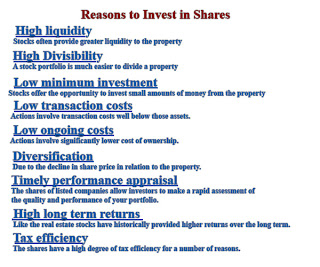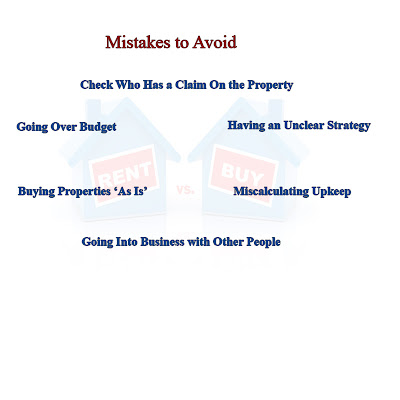If you did not ask, you probably heard that up - "So what is the best investment, property or shares? Forum is typically a backyard barbecue with friends and family and of course it will be interesting to some ardent supporters of one asset class to another, is added to the mixture of its two hundred dollars turned home wisdom.
After hearing too many uninformed answers to this question, I decided to write this short article describing my views on the subject. As an investor of real estate investors and qualified financial planner I hope to give you a more intuitive than what you may have heard in the previous answer.
First let's take a look at the reasons for investing in real estate and stocks, respectively.
After hearing too many uninformed answers to this question, I decided to write this short article describing my views on the subject. As an investor of real estate investors and qualified financial planner I hope to give you a more intuitive than what you may have heard in the previous answer.
First let's take a look at the reasons for investing in real estate and stocks, respectively.
Reasons to Invest in Property
Easier to understand
- Property investment is generally easier to understand that social investment. While real estate investing requires a certain level of sophistication, which does not require the same level of expertise that share investment.Tangibility
- Property investment provides tangible evidence that your hard earned money goes. It is much more rewarding hike through property investment in the aisles of a Woolworths store in which you are a shareholder.Control
- Investing in property offers investors a greater level of control over your investment. When making investment decisions influence property has total investment compared to stock investor whose influence is as great as their right to vote.Potential to add value
- The property offers an investor the opportunity to improve its value is the renovation or development. This feature is not available for actions short of becoming a board member or create your own publicly traded company.High gearing
- Property that relatively small amounts of money to investors to gain exposure to relatively large assets. The property is a unique form of security for banks and in some cases can be fully funded without recourse beyond the property. Shares on the other hand are usually funded up to 70% and the lender has recourse through margin calls against the investor in the LVR is violated.Low volatility
- The property has always provided low volatility relative to equities, despite the rarity of valuation bias the results.High long term returns
- The property has always provided high returns over the long term, especially compared to fixed interest and cash.Tax efficiency
- The property has a high degree of tax efficiency for a number of reasons. First, the returns are composed of a growth component that can be imposed on preferential terms (if held for more than 12 months) with the reduction of capital gains taxes. Second, the property can be strongly oriented resulting in a high deductible interest component. Third, the property allows the deduction of depreciation of a component for the construction of the slab and equipment that improves performance after taxes.Reasons to Invest in Shares
High liquidity
- Stocks often provide greater liquidity to the property. While a line of credit secured by a property can help with the problem, which is not always desirable to increase loans when you need the money.High Divisibility
- A stock portfolio is much easier to divide a property portfolio as well as small amounts of cash requires an investor can sell shares for a similar value of shares when a real estate investor is forced to sell a property.Low minimum investment
- Stocks offer the opportunity to invest small amounts of money from the property. If you only have $ 5,000 to invest you will not have trouble finding stocks to buy, but good luck finding an investment property for that amount of money.Low transaction costs
- Actions involve transaction costs well below those assets. The only costs involved in intermediation shares are traded both in the acquisition and disposition. Property change involves stamp duty, statutory inspections and in relation to the purchase and sale commission legal advertising, agent.Low ongoing costs
- Actions involve significantly lower cost of ownership. Indeed, direct participation involves no ongoing costs, while the property may involve community costs, insurance, property taxes, rental costs, maintenance costs, management fees, rates and repair costs.Diversification
- Due to the decline in share price in relation to the property, it is possible to achieve greater diversification by investing their money in stocks. For example, if you have $ 100,000 to invest, you can choose to issue $ 5,000 in packs of 20 companies from 20 different market sectors. For an equivalent amount of money you would have the opportunity to buy a property without a team.Timely performance appraisal
- The shares of listed companies allow investors to make a rapid assessment of the quality and performance of your portfolio. The investor of action may simply call your broker or see your portfolio value online when the real estate investor has to obtain market valuations and appraisals or all of their property before assessing the performance and value of its portfolio.High long term returns
- Like the real estate stocks have historically provided higher returns over the long term, especially in comparison with fixed interest and cash.Tax efficiency
- The shares have a high degree of tax efficiency for a number of reasons. First, the returns are composed of a growth component that can be imposed on preferential terms (if held for more than 12 months) with the reduction of capital gains taxes. Second, actions can be relatively buoyant resulting in a relatively high deductible interest component. Third, many Australian stocks offer dividends franking credits that can be used to compensate investors with tax obligations. In other words, income per fully paid share dividends provides a tax free income to investors of the action in the marginal tax rate of 30%.The Returns
At the end of the day you can have all the benefits we have spoken, but the bottom of most investors yields. Although we all know that past performance is no guarantee of future results, we are still interested in how they played the asset classes in the past. So now let's turn our attention to the property and share the historical returns.
Over the years, I have seen both sides of the ardent supporters of research in the air waving camp support its assertion that the preferred asset class has always offered the best performance. Some have shares owned and some have slightly exceeding slightly surpassing shares or property taxes on or before the tax base station.
How is this possible you may ask? Well, back to the period of evaluation of research. As with all other asset classes, real estate securities and stocks move in cycles. It is therefore logical that the measurement period that incorporates more peaks and valleys less provide superior performance for the period. Due to the property and generally actions do not move in harmony with each other, each have peaks and valleys at different times of the cycle. Different periods of measures that capture and therefore can provide significant variations in the results.
These are the results of a report commissioned by ASX Perrin Cities. The evaluation period is only one year apart and used for a considerable amount of time to provide the most relevant information.
Over the years, I have seen both sides of the ardent supporters of research in the air waving camp support its assertion that the preferred asset class has always offered the best performance. Some have shares owned and some have slightly exceeding slightly surpassing shares or property taxes on or before the tax base station.
How is this possible you may ask? Well, back to the period of evaluation of research. As with all other asset classes, real estate securities and stocks move in cycles. It is therefore logical that the measurement period that incorporates more peaks and valleys less provide superior performance for the period. Due to the property and generally actions do not move in harmony with each other, each have peaks and valleys at different times of the cycle. Different periods of measures that capture and therefore can provide significant variations in the results.
These are the results of a report commissioned by ASX Perrin Cities. The evaluation period is only one year apart and used for a considerable amount of time to provide the most relevant information.
10 Years To December 2003
Property 12.7%
Shares 8.0%
20 Years To December 2003
Property 15.1%
Shares 11.7%
10 Years To December 2004
Property 11.6%
Shares 11.7%
To December 2004
Property 12.9%
Shares 13.2%
Source: ASX Investment sector performance report Perrin Cities
So what can we do with these results. Okay, enough with that property and shares each provided a long-term relatively high beyond all other traditional asset classes provide.
So what can we do with these results. Okay, enough with that property and shares each provided a long-term relatively high beyond all other traditional asset classes provide.
Conclusion
Property or shares? Given the comparability of historical returns and the many benefits they have everything it should be obvious that the question should not be owned or actions, but rather how and what parts of the property.
So next time you're at a barbecue and misinformed friends pipes up near the property or shares is far superior to the other, be kind to them their ignorance and encourage them to seek professional help finance!
Oh, and when it comes to buying merchandise for your portfolio, do not pay the retail price as everyone else, to acquire property intelligently by extending absolute costs developers. It's easier than you think .
So next time you're at a barbecue and misinformed friends pipes up near the property or shares is far superior to the other, be kind to them their ignorance and encourage them to seek professional help finance!
Oh, and when it comes to buying merchandise for your portfolio, do not pay the retail price as everyone else, to acquire property intelligently by extending absolute costs developers. It's easier than you think .











